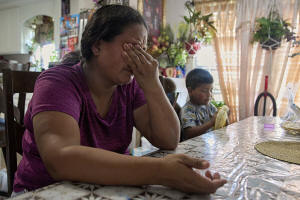As Trump's raids ramp up, a Texas region's residents stay inside — even
when they need medical care
[July 22, 2025]
By AMANDA SEITZ and JACQUELYN MARTIN
WESLACO, Texas (AP) — These days, Juanita says a prayer every time she
steps off the driveway of her modest rural home.
The 41-year-old mother, who crossed into the United States from Mexico
more than two decades ago and married an American carpenter, fears
federal agents may be on the hunt for her.
As she was about to leave for the pharmacy late last month, her husband
called with a frantic warning: Immigration enforcement officers were
swarming the store's parking lot. Juanita, who is prediabetic, skipped
filling medications that treat her nutrient deficiencies. She also
couldn't risk being detained because she has to care for her 17-year-old
daughter, who has Down syndrome.
“If I am caught, who's going to help my daughter?" Juanita asks in
Spanish, through an interpreter. Some people quoted in this story
insisted that The Associated Press publish only their first names
because of concerns over their immigration status.
As the Trump administration intensifies deportation activity around the
country, some immigrants — including many who have lived in Texas's
southern tip for decades — are unwilling to leave their homes, even for
necessary medical care.
Tucked behind the freeway strip malls, roadside taquerias and vast
citrus groves that span this 160-mile stretch of the Rio Grande Valley
are people like Juanita, who need critical medical care in one of the
nation's poorest and unhealthiest regions. For generations, Mexican
families have harmoniously settled — some legally, some not — in this
predominately Latino community where immigration status was once hardly
top of mind.

A ‘very dangerous situation’
White House officials have directed federal agents to leave no location
unchecked, including hospitals and churches, in their drive to remove 1
million immigrants by year's end. Those agents are even combing through
the federal government's largest medical record databases to search for
immigrants who may be in the United States illegally.
Deportations and tougher restrictions will come with consequences, says
Mark Krikorian, the director of the Center for Immigration Studies, a
think tank that favors restrictive immigration policies.
“We shouldn't have let it get out of hand the way we did,” Krikorian
says of the previous administration's immigration policies. “Some
businesses are going to have difficulties. Some communities are going to
face difficulties."
Federal agents' raids began reaching deeper into everyday life across
the Rio Grande Valley in June, just as the area's 1.4 million residents
began their summer ritual of enduring the suffocating heat.
This working-class stretch of Texas solidly backed Trump in the 2024
election, despite campaign promises to ruthlessly pursue mass
deportations. People here, who once moved regularly from the U.S. to
Mexico to visit relatives or get cheap dental care, say they didn't
realize his deportation campaign would focus on their neighbors.
But in recent weeks, restaurant workers have been escorted out mid-shift
and farmers have suddenly lost field workers. Schoolchildren talk openly
about friends who lost a parent in raids. More than a dozen were
arrested last month at local flea markets, according to local news
reports and Border Patrol officials.
Immigrants are staying shut inside their mobiles homes and shacks that
make up the “colonias," zoning-free neighborhoods that sometimes don't
have access to running water or electricity, says Sandra de la Cruz-Yarrison,
who runs the Holy Family Services, Inc. clinic in Weslaco, Texas.
“People are not going to risk it,” de la Cruz-Yarrison says. “People are
being stripped from their families.”
Yet people here are among the most medically needy in the country.
Nearly half the population is obese. Women are more likely to be
diagnosed with cervical cancer and elderly people are more likely to
develop dementia. Bladder cancers can be more aggressive. One out of
every four people lives with diabetes.

As much as a third of the population doesn’t have health insurance to
cover those ailments. And a quarter of people live in poverty, more than
double the national average.
Now, many in this region are on a path to develop worse health outcomes
as they skip doctor appointments out of fear, says Dr. Stanley Fisch, a
pediatrician who helped open Driscoll Children’s Hospital in the region
last year.
“We’ve always had, unfortunately, people who have gone with untreated
diabetes for a long time and now it’s compounded with these other issues
at the moment,” Fisch says. “This is a very dangerous situation for
people. The population is suffering accordingly.”
Trepidations about going to clinics are spreading
Elvia was the unlucky — and unsuspecting — patient who sat down for the
finger prick the clinic offers everyone during its monthly educational
meeting for community members. As blood oozed out of her finger, the
monitor registered a 194 glucose level, indicating she is prediabetic.
She balked at the idea of writing down her address for regular care at
Holy Family Services' clinic. Nor did she want to enroll in Medicaid,
the federal and state funded program that provides health care coverage
to the poorest Americans. Although she is a legal resident, some people
living in her house do not have legal status.
[to top of second column]
|

Maria sobs as she recounts how scared and anxious she is for her
children, including 4-year-old Juan, if she is taken away by ICE
agents, Wednesday, June 18, 2025, while inside her home in Hidalgo
County, Texas. (AP Photo/Jacquelyn Martin)
 Fewer people have come to Holy
Family Services' clinic with coverage in recent months, says billing
coordinator Elizabeth Reta. Over decades, the clinic's midwifery
staff has helped birth thousands of babies in bathtubs or on cozy
beds in birthing houses situated throughout the campus. But now,
Reta says, some parents are too scared to sign those children up for
health insurance because they do not want to share too much
information with the government.
“Even people I personally know that used to have Medicaid for their
children that were born here — that are legally here, but the
parents are not — they stopped requesting Medicaid," Reta says.
Their worry is well-founded.
An Associated Press investigation last week revealed that U.S.
Immigration and Customs Enforcement officials have gained access to
personal health data — including addresses — of the nation's 79
million Medicaid and Children's Health Insurance Program enrollees.
The disclosure will allow ICE officials to receive “identity and
location information of aliens,” documents obtained by the AP say.
In Texas, the governor started requiring emergency room staff to ask
patients about their legal status, a move that doctors have argued
will dissuade immigrants from seeking needed care. State officials
have said the data will show how much money is spent on care for
immigrants who may not be here legally. Federal law requires
emergency rooms to treat any patients who come to the doors.
Visits to Holy Family Services' mobile clinic have stopped
altogether since Trump took office. The van, which once offered
checkups at the doorsteps in the colonias, now sits running on idle.
Its constant hum is heard throughout the clinic's campus, to keep
medical supplies fresh in the 100-degree temperatures.
“These were hard-hit communities that really needed the services,”
de la Cruz-Yarrison says. “People were just not coming after the
administration changed.”

A mother almost loses a son. A daughter is too scared to visit
the doctor
Immigrants were less likely to seek medical care during Trump's
first term, multiple studies concluded. A 2023 study of well-child
visits in Boston, Minneapolis and Little Rock, Arkansas, noted a 5%
drop for children who were born to immigrant mothers after Trump was
elected in 2016. The study also noted declines in visits when news
about Trump's plans to tighten immigration rules broke throughout
his first term.
“It’s a really high-anxiety environment where they’re afraid to talk
to the pediatrician, go to school or bring their kids to child
care,” says Stephanie Ettinger de Cuba, a Boston University
researcher who oversaw the study.
A delayed trip to the doctor almost cost 82-year-old Maria Isabel de
Perez her son this spring. He refused to seek help for his intense
and constant stomach pains for weeks, instead popping Tylenol daily
so he could still labor in the farm fields of Arkansas, she says. He
put off going to the hospital as rumors swirled that immigration
enforcement officials were outside of the hospital.
“He waited and waited because he felt the pain but was too scared to
go to the hospital,” she explains in Spanish through an interpreter.
“He couldn't go until the appendix exploded.”
Her son is still recovering after surgery and has not been able to
return to work, she says.
Perez is a permanent resident who has lived in the United States for
40 years. But all of her children were born in Mexico, and, because
she is a green card holder, she cannot sponsor them for citizenship.
Another woman named Maria, meanwhile, only leaves her house to
volunteer at a local food bank. She's skipped work on nearby farms.
And after last month's arrests, she won't sell clothes for money at
the flea market anymore.
So she stuffs cardboard boxes with loaves of bread, potatoes,
peppers and beans that will be handed out to the hungry. Before the
raids began, about 130 people would drive up to collect a box of
food from Maria. But on this sweltering June day, only 68 people
show up for food.
She brings home a box weekly to her children, ages 16, 11 and 4, who
are spending the summer shut inside. Her 16-year-old daughter has
skipped the checkup she needs to refill her depression medication.
The teenager, who checks in on friends whose parents have been
arrested in immigration raids through a text group chat, insists she
is “doing OK.”
Maria left Mexico years ago because dangerous gangs rule her
hometown, she explains. She's married now to an American truck
driver.
“We're not bad people,” Maria says from her dining room table, where
her 4-year-old son happily eats a lime green popsicle. “We just want
to have a better future for our children.”
Juanita, the prediabetic mother who hasn't filled her prescriptions
out of fear, was not sure when she would brave the pharmacy again.
But with a cross hanging around her neck, the devout Catholic says
she will say three invocations before she does.
Explains her 15-year-old son, Jose: “We always pray before we
leave."
All contents © copyright 2025 Associated Press. All rights reserved |